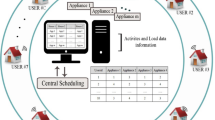Abstract
The rapid increase in demand for electricity and the emergence of the smart grid have dealt with optimistic opportunities for home energy management systems. The smart home with the integration of renewable energy sources such as photovoltaic systems, micro-wind turbines, and battery storage can provide in-house power generation and also give the option of exporting power to the grid. This paper mainly proposes a centralized coordinated neighborhood power-sharing with incentive-based energy management for multiple smart home consumers. The incentive method and various pricing schemes like time of use and feed-in tariff are considered in this paper to determine the electricity billing of all smart home consumers. Due to these incentives and pricing schemes in this model, all smart home consumers are encouraged to be involved in neighborhood energy sharing. A group of ten smart homes with various load profiles and RER energy integration is considered as a test system to determine the performance of the proposed neighborhood smart home energy management model. The simulation results show that the centralized neighborhood-coordinated smart home energy management model can provide significant economic benefits to all smart home consumers when compared to the without neighborhood power-sharing case.
Access this chapter
Tax calculation will be finalised at checkout
Purchases are for personal use only
Similar content being viewed by others
References
Maulik A, Das D (2017) Optimal operation of microgrid using four different optimization techniques. Sustain Energy Technol Assess 21:100–120
Nolan S, O’Malley M (2015) Challenges and barriers to demand response deployment and evaluation. Appl Energy 152:1–10
Zhu Z, Lambotharan S, Chin WH, Fan Z (2015) A game theoretic optimization framework for home demand management incorporating local energy resources. IEEE Trans Ind Inf 11(2):353–362
Muratori M, Schuelke-Leech B-A, Rizzoni G (2014) Role of residential demand response in modern electricity markets. Renew Sustain Energy Rev 33:546–553
Li S, Zhang D, Roget AB, O’Neill Z (2013) Integrating home energy simulation and dynamic electricity price for demand response study
Tejani D, Al-Kuwari AMAH, Potdar V (2011) Energy conservation in a smart home. In: 2011 proceedings of the 5th IEEE international conference on digital ecosystems and technologies conference (DEST), pp 241–246
Pipattanasomporn M, Kuzlu M, Rahman S (2012) An algorithm for intelligent home energy management and demand response analysis. IEEE Trans Smart Grid 3(4):2166–2173
Mohsenian-Rad A, Wong V, Jatskevich J, Schober R, LeonGarcia A (2010) Autonomous demand-side management based on gametheoretic energy consumption scheduling for the future smart grid. IEEE Trans Smart Grid 1(3):320–331
Han J, Choi CS, Park WK, Lee I (2011) Green home energy management system through comparison of energy usage between the same kinds of home appliances. IEEE Trans Consum Electron
Zhu Z, Tang J, Lambotharan S, Chin WH, Fan Z (2011)An integer linear programming and game theory based optimization for demandside management in smart grid. In: 2011 IEEE GLOBECOM Workshops, pp 1205–1210
Caron S, Kesidis G (2009) Incentive-based energy consumption scheduling algorithms for the smart grid. Dept. of Computer Science and Engineering, Penn State, Tech. Rep. CSE-10-003
Han J, Choi CS, Park WK, Lee I, Kim SH (2014) Smart home energy management system including renewable energy based on ZigBee and PLC. IEEE Trans Consum Electron 60(2)
Wang J, Sun Z, Zhou Y, Dai J (2012) Optimal dispatching model of smart home energy management system. In: Innovative smart grid technologies—Asia (ISGT Asia). IEEE, pp 1–5
Paterakis NG, Pappi IN, Catalão JPS, Erdinc O (2015) Optimal operational and economical coordination strategy for a smart neighborhood. In: Proceedings of the IEEE Eindhoven PowerTech, pp 1–6
Atzeni I, Ordonez LG, Scutari G, Palomar DP, Fonollosa JR (2013) Demand-side management via distributed energy generation and storage optimization. IEEE Trans Smart Grid 4:866–876
Gkatzikis L, Koutsopoulos I, Salonidis T (2013) The role of aggregators in smart grid demand response markets. IEEE J Sel Areas Commun 31(7):1247–1257
Celik B, Roche R, Bouquain D, Miraoui A (2018) Decentralized neighborhood energy management with coordinated smart home energy sharing. IEEE Trans Smart Grid 9(6):6387–6397. https://doi.org/10.1109/TSG.2017.2710358
Celik B, Roche R, Bouquain D, Miraoui A (2016) Coordinated energy management using agents in neighborhood areas with RES and storage. In: 2016 IEEE international energy conference (ENERGYCON), pp 1–6. https://doi.org/10.1109/ENERGYCON.2016.7514081
Bhamidi L, Sivasubramani S (2020) Optimal planning and operational strategy of a residential microgrid with demand side management. IEEE Syst J 14(2):2624–2632. https://doi.org/10.1109/JSYST.2019.2918410
Celik B, Roche R, Bouquain D, Miraoui A (2016) Increasing local renewable energy use in smart neighborhoods through coordinated trading. https://doi.org/10.1049/PBPO081E_ch9
Mesarić P, Krajcar S (2015) Home demand side management integrated with electric vehicles and renewable energy sources. Energy Build 108:1–9
Shakouri H, Kazemi A (2017) Multiobjective cost-load optimization fordemand side management of a residential area in smart grids. Sustain Cities Soc 32:171–180
Author information
Authors and Affiliations
Corresponding author
Editor information
Editors and Affiliations
Rights and permissions
Copyright information
© 2024 The Author(s), under exclusive license to Springer Nature Singapore Pte Ltd.
About this paper
Cite this paper
Ravivarma, K., Lokeshgupta, B., Ramanjaneya Reddy, U. (2024). Smart Home Energy Management with a Coordinated Neighborhood Energy Sharing. In: Mahajan, V., Chowdhury, A., Singh, S.N., Shahidehpour, M. (eds) Emerging Technologies in Electrical Engineering for Reliable Green Intelligence. ICSTACE 2023. Lecture Notes in Electrical Engineering, vol 1117. Springer, Singapore. https://doi.org/10.1007/978-981-99-9235-5_17
Download citation
DOI: https://doi.org/10.1007/978-981-99-9235-5_17
Published:
Publisher Name: Springer, Singapore
Print ISBN: 978-981-99-9234-8
Online ISBN: 978-981-99-9235-5
eBook Packages: Intelligent Technologies and RoboticsIntelligent Technologies and Robotics (R0)




